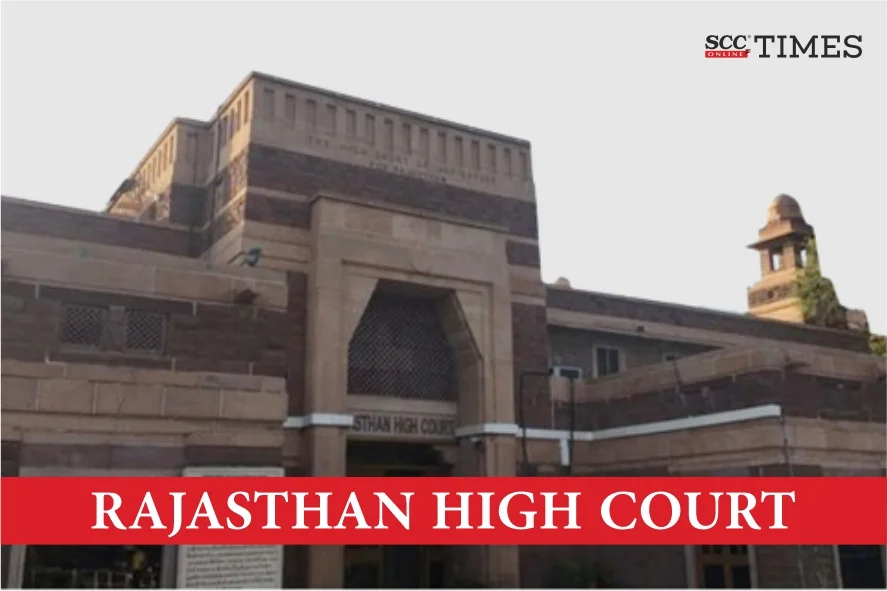Rajasthan High Court: In a petition raising concerns over the illegal activities of Khap Panchayats in Rajasthan, specifically in rural areas of Jodhpur, Barmer, Jaisalmer, Jalore, Nagaur, and Pali, with regard to imposing unlawful social boycotts, fines, and penalties on individuals who do not conform to traditional customs, especially in cases of love marriages, inter-caste and inter-faith marriages, a single-judge bench of Farjand Ali, J., appointed a 5-member panel comprising four advocates and a social worker to conduct a field investigation in affected villages and compile a comprehensive report on unlawful activities conducted under the guise of customs.
The Court also took note of several deeply rooted social evils, including honor killings, caste-based discrimination, gender-based violence, and the practice of exorcism, all of which continue to persist despite legal prohibitions.
“Social boycotts—where individuals are excluded from community privileges and essential resources—are still common in India. Couples who marry against societal norms often suffer economically, as they are denied access to basic resources, employment opportunities, and village benefits, all because of their personal choice in marriage.”
The Court traced the history of social reform movements in India, referring to the contributions of Raja Ram Mohan Roy, Jyotirao Phule, Swami Dayanand Saraswati, Swami Vivekananda, and Dr. B.R. Ambedkar. The Court stated that despite these reforms, social evils such as Khap-imposed boycotts, honor killings, and caste discrimination continue to exist.
The Court emphasised that Khap Panchayats operate outside the purview of the law and impose punishments that violate constitutional rights, including the right to life, personal liberty, and freedom of choice in marriage. The Court referred to Lata Singh v. State of U.P., (2006) 5 SCC 475, where the Supreme Court held that “there is no honor in honor killings; rather, they are shameful acts perpetrated by brutal and feudal-minded individuals.”
The Court further stated that women and lower-caste individuals are particularly vulnerable to these illegal social practices. The Court condemned the labeling of women as ‘daayan’ or witches, which leads to their persecution under the guise of exorcism. The Court further condemned Naata Pratha, a practice leading to parental abandonment, affecting children’s rights and security.
The Court stressed the need for active judicial intervention to curb these practices and called for legal and social measures to protect affected individuals. Recognising the severity of the issue, the Court stated that a systematic, two-phase approach is needed —
-
Investigating the extent of these social evils in affected regions.
-
Formulating measures to eliminate or curb such practices.
The Court appointed a panel of four advocates and one social worker to investigate the illegal activities of Khap Panchayats and social boycotts in affected areas. The commission members are Mr. Ramavtar Singh Chaudhary, Mr. Bhagirath Ray Bishnoi, Ms. Shobha Prabhakar, Mr. Devkinandan Vyasand Shri Mahaveer Kankariya (Social Worker). The Court also acknowledged Mr. Mahaveer Kankariya, founder of “Jiyo Aur Jine Do Trust,” for his willingness to support the investigation by providing travel, boarding, and lodging facilities for the team.
The Court directed the appointed members to visit affected villages, interact with victims, local authorities, and law enforcement, and compile a detailed report on the extent of illegal Khap activities. The Court instructed the Superintendent of Police in affected districts to provide full security to the commission members, including armed protection during their visits. The Court directed the commission to submit an exhaustive report to the court, detailing the extent of social evils and providing recommendations for legal interventions and listed the matter for further proceedings on 14-05-2025.
[Bhaka Ram v. State of Rajasthan, 2025 SCC OnLine Raj 632, Decided on 07-03-2025]
Advocates who appeared in this case :
Mr. Arjun Singh, Mr. Divik Mathur and Mr. Bhagirath Ray Bishnoi, Counsel for the Petitioners
Mr. Vikram Singh Rajpurohit, Dy.G.A. and Mr. Ravindra Singh, AGA, Counsel for the Respondent
Mr. Tejkaran, SHO, Luni, Present-in-Person






